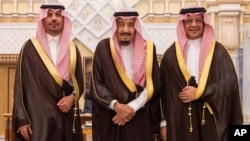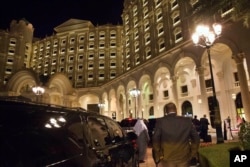Two weeks ago the glitzy Ritz Carlton hotel in Riyadh was the site of an international conference promoting Saudi Arabia as an investment destination, with over 3,000 officials and business leaders attending.
Now the hotel is temporarily serving as a luxury prison where some of the kingdom's political and business elite are being held in a widening crackdown on corruption that may change the way the economy works.
By detaining dozens of officials and tycoons, a new anti-corruption body headed by Crown Prince Mohammed bin Salman is seeking to dismantle systems of patronage and kick-backs that have distorted the economy for decades.
But it is a risky process, because the crackdown is hurting some of the kingdom's top private businessmen — leaders of family conglomerates who have built much of the non-oil economy over the past few decades.
Many industries could suffer if investment by these families dries up in coming months, at a time when the economy has already fallen into recession because of low oil prices and austerity policies.
New breed of companies
Meanwhile, a new breed of state-backed companies is rising to compete with the old guard; many of the new enterprises are linked to the Public Investment Fund (PIF), the kingdom’s top sovereign wealth fund. But it is not clear how smoothly the transition to these firms will happen.
“The rules of the game are changing. But they’re changing indiscriminately,” said one financial analyst in the region, declining to be named because of political sensitivities. “Even people who thought they were within the rules don’t know if they will still be within those rules tomorrow. There’s just uncertainty.”
Some private businessmen in Saudi Arabia are now trying to move their money out of the country “while they still can,” the analyst said.
For many foreigners, the most shocking aspect of the purge has been the detention of billionaire Prince Alwaleed bin Talal, the flamboyant, internationally known chairman of investment firm Kingdom Holding.
But for Saudis, the names of other detainees have been equally stunning: Nasser bin Aqeel al-Tayyar, founder of the Al Tayyar Travel group; billionaire Saleh Kamel; and Bakr bin Laden, chairman of the huge Saudi Binladin construction conglomerate.
State contracts
The saga of the Binladin group underlines how the business environment is changing. Binladin and another big construction group, Saudi Oger, long enjoyed preferential access to the kingdom's biggest projects and control over pricing as a result of their close relationships with royal patrons.
But the bottom fell out from under both companies last year, when a cash squeeze resulting from low oil prices caused the government to cancel or suspend projects and delay payments.
The firms faced multi-billion dollar debt restructurings; Binladin has laid off tens of thousands of people while Oger’s bankers say it has essentially stopped operating.
New construction company
At the same time, state oil giant Saudi Aramco is moving to set up a construction company with local and international partners to build non-oil infrastructure in Saudi Arabia — potentially taking billions of dollars of business that would previously have gone to the family conglomerates.
Aramco and PIF, the sovereign fund, have also linked up with U.S. construction firm Jacobs Engineering to form a management company for strategic projects in the kingdom.
Many in the Saudi business world are celebrating the downfall of the old patronage system and the shift toward a “cleaner” business environment.
“It's great news for the clean ones among us — 99.99 percent are ecstatic,” said one senior executive.
But others express disquiet about the possible economic fallout of the purge. Some are concerned that banks could start calling in loans to families implicated in the probe, using loan clauses that permit this in cases of legal jeopardy; this could collapse companies’ share prices.
Business deals put in limbo?
Many new business deals may be put on hold. A businessman at a foreign technology services firm told Reuters he had been considering a venture with a Saudi partner, but decided against it this week because of the partner’s ties to the detained Bakr bin Laden.
The new anti-corruption commission has broad authority to seize assets at home and abroad. Some businessmen wonder if these powers could be used to pressure firms into participating in Prince Mohammed’s economic development projects.
“It's the old royal fiefdoms that are not in the Al Salman branch of the royal family that are now being purged,” said a Western analyst. “It’s a further centralising of political and economic power, and a seizing of the private assets that those fiefdoms have accumulated.”










